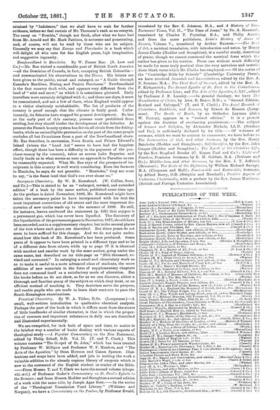Practical Chemistry. By W. A. Tilden, D.Sc. (Longmans.)—A small, well-written
introduction to qualitative chemical analysis. Perhaps the part of the book in which it differs most from the scores of little handbooks of similar character, is that in which the proper- ties of common and important substances in daily use are described and illustrated experimentally.
We are compelled, for lack both of space and time, to notice in the briefest way a number of books dealing with various aspects of theological study :—A Popular Commentary on the New Testament, edited by Philip Schaff, D.D. Vol. IL (T. and T. Clark.) This volume contains "The Gospel of St. John," which has been treated by Professor W. Milligan and Professor W. F. Moulton, and " The Acts of the Apostles," by Dean Howson and Canon Spence. Illus- trations and maps have been added, and join in making the work a valuable addition to the already copious library of exegesis which is now at the command of the English student or reader of the Bible. —From Messrs. T. and T. Clark we have the second volume (chaps. viii.-xvi.) of Professor Godet's Commentary on St. Paul's Epistle to the Romans ; and from Messrs. Hodder and Stoughton a second edition of a work with the same title, by Joseph Agar Beet.—In the series of the "Theological Translation Fund Library" (Williams and Norgate), we have a Commentary on the Psalms, by Professor Ewald, translated by the Rev. E. Johnson, MA., and A .History of New- Testament Times, Vol. II., "The Time of Jesus," by Dr. A. Hausrath, translated by Charles T. Punting, B.A., and Philip Auzer ; and from the same publishers, Keisn's History of Jesus of Nazara, Volume V., translated by Arthur Ransom.—The Book of Job, a metrical translation, with introduction and notes, by Henry James Clarke (Hodder and Stoughton), is a careful study, deserving of praise, though we cannot commend the metrical form which the author has given to his version. Prose can without much difficulty be made far more truly poetical than the very nerveless and unmelo- diens blank verse which Mr. Clarke has employed.— Of the series of the "Cambridge Bible for Schools" (Cambridge University Press), we have received Jeremiah and Lamentations, edited by the Rev. A. N. Streane, M.A.; The First Book of Samuel, edited by the Rev. A. F. Kirkpatrick ; The Second Epistle of St. Paul to the Corinthians, edited by Professor Lies; and The Acts of the Apostles, I.-X f V., edited by Professor J. R. Lumley.—In general theology, we have The Humiliation of Christ, by Alex. B. Bruce, D.D.; a "Second Edition, Revised and Enlarged," (T. and T. Clark) ; The Angel Messiah of Christians, Buddhists, and Essenes, by Ernest do Bunsen (Long- man). The Death of Death, by an Orthodox Layman (Johu W. Patton), appears in a " revised edition." It is a protest against the doctrine of everlasting puuishment.—The subject of Science and Religion, by Alexander Michels, LL.D. (Strahau and Co.), is sufficiently declared by its title.—Of volumes of sermons, which we must be content to enumerate, we have before us The Incarnation of God, and other Sermons, by the Rev. Henry Batchelor (Hodder and Stoughton) ; Self-Sacrifice, by the Rev. John Cooper (Hodder and Stoughton) ; The Spirit of the Christian Life, by the Rev. Stopford Brooke (C. Kagan Paul and Co.) ; Light and Freedom, Fourteen Sermons, by E. M. Geldart, M.A. (Triibner and Co.) ; Middle-class, and other Sermons, by the Rev. J. T. Jeffcock (Beinrose) ; The Souls of the Righteous, by William Richard Savage, M A (Chapman and Hall) ; Passion-tide and Easter-tide, Sermons, by Alfred Barry, D.D. (Simpkin and Marshall) ; Positire Aspects of Unitarian Christianity, with a preface by the Rev. James Martineau (British and Foreign Unitarian Association).


































 Previous page
Previous page